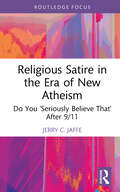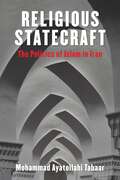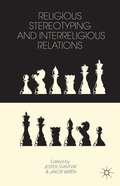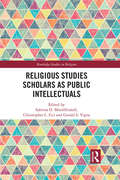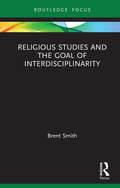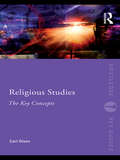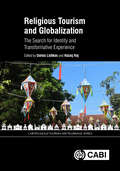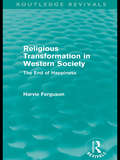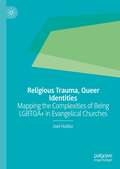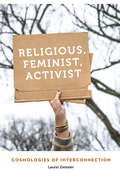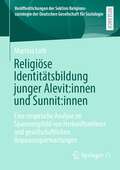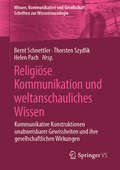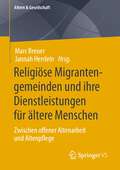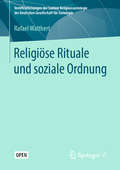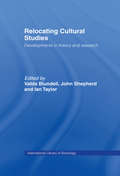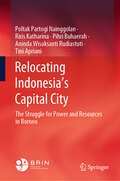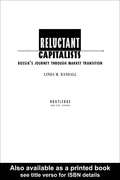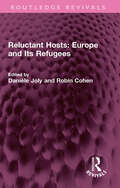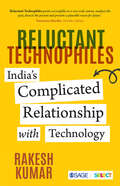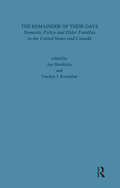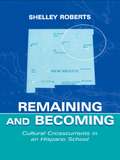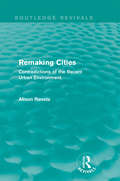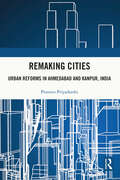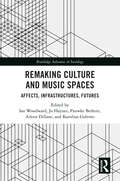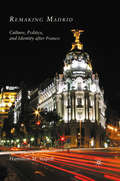- Table View
- List View
Religious Satire in the Era of New Atheism: Do You ‘Seriously Believe That’ After 9/11 (The Cultural Politics of Media and Popular Culture)
by Jerry C. JaffeReligious Satire in the Era of New Atheism presents a contemporary account of religious satire as evidenced by the modern art of stand-up comedy.Focused on the context of the post-9/11 American culture phenomenon, sometimes referred to as the New Atheism – as embodied by public intellectuals such as Christopher Hitchens, Sam Harris, and Richard Dawkins – it documents the rise of comedic satire in relation to evangelical beliefs and religious dogma. Drawing on the author’s own experience of stand-up performance, it examines the comedy of figures such as Mark Maron, Bill Maher, and Ricky Gervais and presents material from interviews with comedians including Lewis Black, John Fugelsang, and Leigh Ann Lord to provide unique insights into some of the issues and definitions surrounding satire.With attention to the demonstrable rise in religious satire following the events of September 11, 2001, the author considers the clear link between this increase and the New Atheist movement, exploring shared themes and presence at specific events, such that stand-up comedy represents the Avant Garde of the New Atheists.
Religious Statecraft: The Politics of Islam in Iran (Columbia Studies in Middle East Politics)
by Mohammad Ayatollahi TabaarSince the 1979 revolution, scholars and policy makers alike have tended to see Iranian political actors as religiously driven—dedicated to overturning the international order in line with a theologically prescribed outlook. This provocative book argues that such views have the link between religious ideology and political order in Iran backwards. Religious Statecraft examines the politics of Islam, rather than political Islam, to achieve a new understanding of Iranian politics and its ideological contradictions.Mohammad Ayatollahi Tabaar traces half a century of shifting Islamist doctrines against the backdrop of Iran’s factional and international politics, demonstrating that religious narratives in Iran can change rapidly, frequently, and dramatically in accordance with elites’ threat perceptions. He argues that the Islamists’ gambit to capture the state depended on attaining a monopoly over the use of religious narratives. Tabaar explains how competing political actors strategically develop and deploy Shi’a-inspired ideologies to gain credibility, constrain political rivals, and raise mass support. He also challenges readers to rethink conventional wisdom regarding the revolution, Ayatollah Khomeini, the U.S. embassy hostage crisis, the Iran-Iraq War, the Green Movement, nuclear politics, and U.S.–Iran relations. Based on a micro-level analysis of postrevolutionary Iranian media and recently declassified documents as well as theological journals and political memoirs, Religious Statecraft constructs a new picture of Iranian politics in which power drives Islamist ideology.
Religious Stereotyping and Interreligious Relations
by Jesper Svartvik Jakob WirénReligion can heal, but it can hurt as well. This collection of essays addresses some key issues of religious stereotyping, prejudice, and discrimination, and considers a wide range of important topics which haunt our societies today. When stereotyping becomes the oxygen we inhale, when it is so important to us that we cannot see how we can survive without it - what can and should we do? Twenty-two scholars from Australia, Europe, the Middle East and North America explore the anatomy of various forms of stereotyping and ways to oppose them.
Religious Studies Scholars as Public Intellectuals (Routledge Studies in Religion)
by Sabrina D. MisirHiralall Christopher L. Fici Gerald S. VignaThe prominence of religion in recent debates around politics, identity formation, and international terrorism has led to an increased demand on those studying religion to help clarify and contextualise religious belief and practice in the public sphere. While many texts focus on the theoretical development of the subject, this book outlines a wider application of these studies by exploring the role of religious studies scholars and theologians as public intellectuals. This collection of essays first seeks to define exactly what makes an intellectual "public". It then goes on to deal with a few questions of concern: How do public intellectuals construct knowledge in religious and theological scholarship? What is the link between public intellectuals of higher education and their role in society? Do higher education institutions have a responsibility to endorse public intellectualism? Looking at the individual and collective role of religious studies scholars and theologians in public life, this book will be of great interest to all scholars and academics involved in religious studies and theology across the academy.
Religious Studies and the Goal of Interdisciplinarity (Routledge Focus on Religion)
by Brent SmithThis book offers a survey of the development of interdisciplinarity in religious studies within academia and offers ways for it to continue to progress in contemporary universities. It examines the use of the term ‘interdisciplinary’ in the context of the academic study of religion and how it shapes the way scholarly work in this field has developed. The text uses two main elements to discuss religious studies as a field. Firstly, it looks at the history of the development of religious studies in academia, as seen through an interdisciplinary critique of the university as an epistemological project. It then uses the same interdisciplinary critique to develop a foundation for a 21st-century hermeneutic, one which uses the classical concepts reprised by that interdisciplinary critique and retools the field for the 21st century. Setting out both the objects of religious studies as a subject and the techniques used to employ the study of those objects, this book offers an invaluable perspective on the progress of the field. It will, therefore, be of great use to scholars of research methods within religious studies.
Religious Studies: The Key Concepts (Routledge Key Guides)
by Carl OlsonReligious Studies: The Key Concepts is an accessible, A-Z resource, defining and explaining key terms and ideas central to the study of religion. Exploring broad and recurring themes which are applicable in both eastern and western religions, cross-cultural examples are provided for each term to give a comprehensive overview of the subject. Subjects covered include: afterlife comparative religion festivals ethics gender monotheism world religions modernity pilgrimage theism secularization With cross referencing and further reading provided throughout, this book provides an inclusive map of the discipline, and is an essential reference for all students, academics and researchers.
Religious Tourism and Globalization: The Search for Identity and Transformative Experience (CABI Religious Tourism and Pilgrimage Series)
by Dr Nour Farra-Haddad Vitor Ambrósio Alison T. Smith Jaffer Idris Dimitrios Mylonopoulos Ricardo Nicolas Progano Silvia Aulet Serrallonga Spyridon Parthenis Dr Dino Bozonelos Polyxeni Moira Caglar Bideci Mujde Bideci Elzbieta Bilska-Wodecka Stephen F. Haller Antonietta Ivona Isilda Leitão Eleanor O’Keeffe Donatella PriviteraIs it possible to identify the positive and negative effects of globalization on religious tourism or to estimate the transformation of the internal and external constructs of pilgrimage by these effects? In order to address these questions, this book highlights the importance of the search for identity and transformative experience during religious tourism. It also looks at how, recently, globalization has played a part in the changes of the concept of personal and social identity and the transformative experience of pilgrimage. The chapters, consisting of carefully selected case studies, analyse possible effects including the adoption of different new rituals, new pilgrims' values, changes of tradition, acceptance of technologic innovations, development of new business models, and other environmental and sociocultural changes. The book provides: · a conceptual framework for understanding the impacts of globalization; · integrated cross-disciplinary approaches; and · an insight into major religious travel practices in the age of identity challenges and worldwide transformations. It will be suitable for researchers and students of religious tourism, pilgrimage, identity tourism, as well as related subjects such as sociology, anthropology, psychology, theology, history and cultural studies.
Religious Transformation in Western Society (Routledge Revivals): The End of Happiness
by Harvie FergusonOriginally published in 1992, this remarkable book challenges many of the assumptions governing the Sociology of Religion and the Sociology of Culture by arguing that Western religion is neither science nor morality - it is the promise of happiness. Learned and incisive, it will be essential reading for students of religion, culture and anyone interested in the character of Modernity.
Religious Trauma, Queer Identities: Mapping the Complexities of Being LGBTQA+ in Evangelical Churches
by Joel HollierIn a polarised milieu that too often posits “queer” and “Christian” as competing realms, this book explores the complexities of identity development, religious traumatisation, and the task of creating safe faith spaces in which LGBTQA+ people can find healing, particularly in the Evangelical context. First, Joel Hollier examines the historical path of Evangelicalism, providing context for the current terrain of the “culture war” we find ourselves in. He then parses out experiences of gender/sexuality and religious/spiritual identity development, grounding them in an evolving theoretical base. Finally, Hollier offers a rounded critique of Evangelical church structures and mechanisms of trauma that hinder the healing process, along with potential sources of healing. Central to this work are the voices of LGBTQA+ people whose stories weave together a deeper understanding of the harms the Church has perpetrated, and the path forward.
Religious, Feminist, Activist: Cosmologies of Interconnection (Anthropology of Contemporary North America)
by Laurel ZwisslerIn Religious, Feminist, Activist, Laurel Zwissler investigates the political and religious identities of women who understand their social-justice activism as religiously motivated. Placing these women in historical context as faith-based activists for social change, this book discusses what their activities reveal about the public significance of religion in the pluralistic context of North America and in our increasingly globalized world. Zwissler’s ethnographic interviews with feminist Catholics, Pagans, and United Church Protestants reveal radically different views of religious and political expression and illuminate how individual women and their communities negotiate issues of personal identity, spirituality, and political responsibility. Political activists of faith recount adventurous tales of run-ins with police, agonizing moments of fear and powerlessness in the face of global inequality, touching moments of community support, and successful projects that improve the lives of others. Religious, Feminist, Activist combines religion, politics, and globalization—subjects frequently discussed in macro terms—with individual personalities and intimate stories to provide a fresh perspective on what it means to be religiously and politically engaged. Zwissler also provides an insightful investigation into how religion and politics intersect for women on the political left.
Religiöse Identitätsbildung junger Alevit: Eine empirische Analyse im Spannungsfeld von Herkunftsmilieus und gesellschaftlichen Anpassungserwartungen (Veröffentlichungen der Sektion Religionssoziologie der Deutschen Gesellschaft für Soziologie)
by Martina LothSowohl junge Alevit:innen als auch junge Sunnit:innen sind in Deutschland aufgrund eines vorwiegend negativen Images des Islams herausgefordert, sich bezüglich ihrer muslimischen oder vermeintlich muslimischen Identität zu positionieren. Gleichzeitig sehen sich die beiden Gruppen in der Diaspora religionsrechtlich mit verschiedenen Bedingungen konfrontiert. Die alevitische Gemeinde Deutschlands (kurz AABF) hat durch ihren Status als Körperschaft des öffentlichen Rechts und der Durchführung des alevitischen Religionsunterrichts in der Mehrzahl der Bundesländer religionsrechtlich in Deutschland eine bessere Ausgangsposition erreichen können als die Türkisch-Islamische Union der Anstalt für Religion e.V. (kurz DİTİB). In dem Buch werden Gemeinsamkeiten und Unterschiede der sich diesen Gruppen zugehörig fühlenden jungen Adoleszenten in Bezug auf ihre religiöse Identitätsbildung untersucht.
Religiöse Kommunikation und weltanschauliches Wissen: Kommunikative Konstruktionen unabweisbarer Gewissheiten und ihre gesellschaftlichen Wirkungen (Wissen, Kommunikation und Gesellschaft)
by Bernt Schnettler Thorsten Szydlik Helen PachDer Band exploriert die systematischen Bezüge zwischen Wissens- und Religionssoziologie. Zunächst enthält er daher die deutsche Erstübersetzung des klassischen Aufsatzes zu diesem Thema von Berger und Luckmann aus dem Jahr 1965. Das Spektrum der Beiträge umfasst aktuelle Forschungen über diverse Formen religiöser Kommunikation und weltanschaulichen Wissens aus drei Bereichen: Erstens empirische Studien zu religiösen und weltanschaulichen Kommunikationsgattungen, Veranstaltungsformen und Diskursen, zweitens Beiträge zu methodischen Zugriffen für die Analyse religiöser Kommunikation und die Weltanschauungs-analyse sowie drittens theoretische Beiträge zu wissenssoziologischen Aspekten religiösen und weltanschaulichen Wissens. Dabei werden soziologische sowie religionswissenschaftliche und linguistische Perspektiven eingenommen.Der InhaltWissens- und Diskursforschung • Staatliche Interventionen • Naturwissenschaft, Sinnkonstruktion und Weltanschauung • Erlösungskommunikation • Transformation religiöser Sinnresiduen • Gattungen der Sinnvermittlung • Rhetoriken der Normativität • Unsichtbare Religion in Massenereignissen Die Herausgeber*innenProf. Dr. Bernt Schnettler ist Inhaber des Lehrstuhls Kultur- und Religionssoziologie an der Universität Bayreuth. Thorsten Szydlik ist Wissenschaftlicher Mitarbeiter am Institut für Soziologie der Universität Marburg.Helen Pach ist Wissenschaftliche Mitarbeiterin am Lehrstuhl Kultur- und Religionssoziologie an der Universität Bayreuth.
Religiöse Migrantengemeinden und ihre Dienstleistungen für ältere Menschen: Zwischen offener Altenarbeit und Altenpflege (Altern & Gesellschaft)
by Marc Breuer Jannah HerrleinWelche Relevanz haben religiöse Migrantengemeinden für die alltägliche Unterstützung und Pflege von älteren Menschen mit Migrationserfahrung? Professionelle Dienstleistungen der Altenhilfe werden in der genannten Bevölkerungsgruppe bislang nur unterdurchschnittlich genutzt. Gleichzeitig ist bekannt, dass migrantische Religionsgemeinschaften vielfältige soziale Dienstleistungen erbringen. Das Buch verbindet Erkenntnisse und Perspektiven aus Gerontologie, Migrations- und Religionssoziologie, Soziologie des Alter(n)s, Sozialer Arbeit und Sozialpolitikforschung sowie aus den theologischen Wissenschaften verschiedener Religionsgemeinschaften. Zahlreiche Gemeinden positionieren sich als Akteure einer offenen Altenarbeit oder stellen Anschlüsse zur professionellen Altenpflege her.
Religiöse Rituale und soziale Ordnung (Veröffentlichungen der Sektion Religionssoziologie der Deutschen Gesellschaft für Soziologie)
by Rafael WalthertIn diesem Open-Access-Buch wird die Bedeutung von religiösen Ritualen für die soziale Ordnung systematisch untersucht. Dazu werden Konzepte des Zusammenhangs von Ritualen mit verschiedenen Ebenen des Sozialen erarbeitet: Interaktion, Gemeinschaft und Gesellschaft.
Relocating Cultural Studies: Developments in Theory and Research (International Library of Sociology)
by Ian Taylor John Shepherd Valda BlundellBritain is no longer the sole organizing centre for cultural studies. The contributors to this volume demonstrate how cultural studies has diffused into other English-speaking countries and how its original concerns have been renegotiated and changed. The result is a landmark book which provides students with an unrivalled guide to the international phenomenon of cultural studies.
Relocating Indonesia’s Capital City: The Struggle for Power and Resources in Borneo
by Poltak Partogi Nainggolan Riris Katharina Pihri Buhaerah Aninda Wisaksanti Rudiastuti Tini AprianiThis book looks at the process of relocating Indonesia's capital from Jakarta to Nusantara in East Kalimantan. It looks critically at the surrounding conflict and its causes, as well as the solution from the perspective of evidence-based-policy and regulatory impacts assessments whose presence is increasingly needed today, to campaign for participatory policies and achieve the right targets. It is not widely known that the process of relocation of the capital took place behind closed doors and unilaterally. Through a closed legislative process, without public debate, and by amending the constitution later, this takeover process took place without resistance from disadvantaged regions. Following this, when the central government faced financing difficulties along the way, its development budget initially relied on foreign investment, then became dependent on domestic financing, both sourced from state finances (APBN) and local resources. From here, the book maps the subsequent problems that arose, the first of which relates to local resources. It shows how local residents are also affected with land evictions without proper relocation. Through political-economic research and analysis, the book dissects the conflict as it appears in central-regional power relations, by exploring the roots of the problem and recommending several solutions, as well as looking at possible future development of the conflict. This timely book is helpful to those who carry out development studies and are involved in making public policy for campus, government, parliament and the business world.
Reluctant Capitalists: Russia's Journey Through Market Transition
by Linda M. RandallReluctant Capitalists examines Russia's plodding, sometimes painful, journey toward a free-market. Through case studies, interviews and first-hand observation, Randall tells us of Russia's economic troubles and offers suggestions for making market reform work.
Reluctant Hosts: Europe and Its Refugees (Routledge Revivals)
by Robin Cohen Danièle JolyNow reissued with a new Preface by Robin Cohen and Danièle Joly this book was originally published in 1989 at a time when the reality of a single European Community had begun to materialize the comfortable belief that many European countries offered havens for those fleeing persecution was undermined as governments sought to cope with xenophobic and racist sentiments by their indigenous populations. This book, with contributions from social scientists, policy-makers and representatives from many European countries discusses the response of European governments to the increasing demands by asylum-seekers, refugees and exiles for admission, settlement and protection: issues which remain as pertinent today as when the book was originally published.
Reluctant Technophiles: India’s Complicated Relationship with Technology
by Rakesh KumarThe past was glorious. A future disrupted by technology is almost here. But India still awaits its technology-based prosperity. With deep-rooted inequalities, disinformation and corruption running through the veins of the Indian society, it’s hypocritical to pretend that technological solutions can solve all our problems. We are also relatively unprepared for the genuine challenges technology presents. While the benefits of technology are numerous, the challenges have the potential to magnify existent biases, exacerbate social and economic inequality, and break the social fabric. Reluctant Technophiles: India’s Complicated Relationship with Technology sheds light on what technology can solve and what it can’t. Drawing from the discussions of ancient religious text, quantum computing, Greek mythology and current events, the book tries to find the sweet spot at the intersection of technology, policy and society.
Remainder of Their Days: Domestic Policy & Older Families in the United States & Canada
by Jon Hendricks; Carolyn J. RosenthalFirst published in 1993. This present volume, co-edited by two sociologists, Jon Hendricks of the United States and Carolyn Rosenthal of Canada, focuses on a comparative, cross-national discussion of social policies of the United States and Canada, especially those related to health care. The uniqueness o f this work lies in the fact that it views family experiences from both a Canadian and an American perspective. In addition, this book not only fills a gap in our know ledge of social policies, but contributes to our understanding of how these policies shape and effect the lives o f older fam ilies in both countries.
Remaining and Becoming: Cultural Crosscurrents in An Hispano School (Sociocultural, Political, and Historical Studies in Education)
by Shelley RobertsRemaining and Becoming: Cultural Crosscurrents in an Hispano School deals with the politics of identity and the concept of boundaries during a time of rapid change. It investigates how the role of schooling for Hispanos in the Norteño School District (a pseudonym) in Northern New Mexico--a public school district, not fully consolidated until 1972--has changed significantly over the past three generations. Today, the Hispanos, a minority in the outside world but a majority in their own, are debating how the functions of the school should respond to the changes resulting from the coming of public education to their region. But the contemporary story of education in Norteño has much deeper roots in the political, religious, and cultural history of Northern New Mexico--a region where, over a period of several centuries, Spain, Mexico, and the United States each have claimed sovereignty, with differing goals for and attitudes about the welfare of the people. This study is an analysis of the ambiguity of education, the losses and gains that are its consequences, the lingering doubts about the past, and the questions about what future education can and should serve. It is about asking: Is what the students are learning worth as much as what they are forgetting? How does schooling affect the evolving process of asserting, renegotiating, and defending an Hispano identity? By exploring historical factors and ideologies of a particular school within a particular community, Roberts seeks to understand community expectations for the school as a fitting place for its children. The goal is not to generalize from the particular to the universal, but to join others in suggesting that we move away from discussing students in a generic sense and focus instead on looking at them in relation to the community in which they live. The fascinating and largely unknown story this book tells will be of interest to educators, researchers, and students across a range of fields, including sociology of education, educational anthropology, multicultural education, ethnic studies, Chicano studies, and qualitative research in education.
Remaking Cities: Contradictions of the Recent Urban Environment (Routledge Revivals)
by Alison RavetzThis book, published in 1980, is an iconoclastic account of one of the pillars of the welfare state, British town and country planning, between 1945 and 1975. Always a fine balance between central control and market forces, it was challenged by strains within and between the environmental professions and protest by people dispossessed or alienated by re-shaped urban environments. Remaking Cities critiques the export of western-style planning to the developing world and reviews initiatives rooted in different understandings of ‘growth’ appearing in those years. Nearly forty years on, many of the same issues beset us, notably the depressingly familiar inner city problem, despite countless reports, funds and ‘programmes’. But now our infrastructure and services, once publicly owned, are privatised and fragmented, and local government progressively relegated. The very core of planning, development control, is being pared in a struggle to regain the ‘growth’ which led to our current crisis. This gives fresh importance to the need for new modes of creating liveable, sustainable environments, emphasised in this important work.
Remaking Cities: Urban Reforms in Ahmedabad and Kanpur, India
by Praveen PriyadarshiThis book presents a systematic analysis of the differential implementation of the urban reforms in two Indian cities, Ahmedabad and Kanpur. It analyses the enactment of the Jawaharlal Nehru National Urban Renewal Mission (JNNURM), launched in 2005 by the Indian government, which aimed to spatially reorient cities into market-friendly places across 65 sites across the country but finished with only modest success. The volume discusses the specificities of urban governance systems, municipal history of a colonial city, and nationalist struggle in relation to urban planning and policy reforms to showcase how policies insensitive to these are likely to fail. It identifies historically constituted municipal capacity — located in the municipal organization at the city level — as the key determinant of divergent trajectories of the spatial changes. The analysis demonstrates that in Ahmedabad, the politics of the city was historically oriented towards peoples’ relationship with their spaces, enabling a coherent municipal organisation. In the case of Kanpur however, the local politics evolved in a way that the urban question remained unresolved, which resulted in a fragmented municipal organisation. This variation in the architectures of municipal organisations in the two cities therefore resulted in different levels of municipal capacities at the time of the inauguration of the JNNURM. A richly detailed case study on urban governance issues and development in Indian cities, this book will be an essential read for scholars and researchers of urban studies, urban politics, development studies, social anthropology, social history, political science, development studies, public policy and governance, urban sociology, and South Asian studies.
Remaking Culture and Music Spaces: Affects, Infrastructures, Futures (Routledge Advances in Sociology)
by Ian Woodward, Jo Haynes, Pauwke Berkers, Aileen Dillane, and Karolina GolemoThis collection analyses the remaking of culture and music spaces during the ongoing COVID-19 pandemic. Its central focus is how cultural producers negotiated radically disrupted and uncertain conditions by creating, designing, and curating new objects and events, and through making alternative combinations of practices and spaces. By examining contexts and practices of remaking culture and music, it goes beyond being a chronicle of how the pandemic disrupted cultural life and livelihoods. The book also raises crucial questions about the forms and dynamics of post-pandemic spaces of culture and music. Main themes include the affective and embodied dimensions that shape the experience, organisation, and representation of cultural and musical activity; the restructuring of industries and practices of work and cultural production; the transformation of spaces of cultural expression and community; and the uncertainty and resilience of future culture and music. This collection will be instrumental for researchers, practitioners, and students studying the spatial, material, and affective dimensions of cultural production in the fields of cultural sociology, cultural and creative industries research, festival and event studies, and music studies. Its interdisciplinary nature makes it beneficial reading for anyone interested in what has happened to culture and music during the global pandemic and beyond.
Remaking Madrid
by Hamilton M. StapellThe first full-length study of Madrid's transformation from the dreary home of a former dictatorship to a modern and vibrant city.
